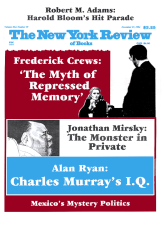In response to:
The Pill of Pills from the June 9, 1994 issue
To the Editors:
I’ve received several letters objecting to my characterization of the neurologist Otto Loewi as an Austrian Jew, in my review of Peter Kramer’s Listening to Prozac [NYR, June 9]. I deliberately chose to describe him in this way and it may be appropriate to explain why.
Actually, the real choice was made by the Austrians themselves quite long ago, who never let people like Loewi forget that they were Jews first and Austrians only distantly second, if at all. In 1897, the year after Loewi graduated from the German University at Strasbourg, the citizens of Vienna elected as their mayor one Karl Lueger, who had run on an openly anti-Semitic platform. Some authors trace the acceleration of modern Central European anti-Semitism to the mid-1870s, following a stockmarket crash in Germany that was blamed on the failed financial dealings of a Jewish railroad magnate. Anti-Jewish sentiment increased considerably after that time, especially in the German-speaking universities. To quote the Stanford historian Gordon Craig, writing of that period:
On no class in Germany did the identification of Jews with materialism and its political and cultural manifestations have greater influence than upon the self-proclaimed protectors of the national heritage, the university professors. At the same time, no more uncritical acceptance of the claims of German nationalism was to be found than in university faculties.
The same was true in Austria, particularly at the University of Vienna, whose chief surgeon, Theodor Billroth, published in 1876 a highly acclaimed book on medical education containing long passages of anti-Semitic diatribe. It was never easy to be a Jew in an Austrian university, and the situation worsened until its well-known climax in the 1930s.
Here is Loewi writing of the night when Kurt von Schushnigg responded to the Anschluss by resigning as of president of Austria:
I awoke from a deep sleep at 3 o’clock in the morning when a dozen young storm troopers, armed with guns, broke into my bedroom, took me downstairs, and pushed me without any explanation into a waiting prison van that took me and others to the city jail.
He was then expelled from the country.
Before leaving, in the presence of Gestapo men, I had to order the Swedish bank to transfer the Nobel prize money, deposited with the bank in 1936, to a prescribed Nazi-controlled bank.
Readers have questioned the relevance of Otto Loewi’s Jewishness to his research on neurotransmitters; but I feel that the historical situation makes his being a Jew enormously relevant. It is not necessary to describe Peter Kramer (or me) as a “Jew,” because that fact is not relevant. Peter Kramer is an American, and as much an American as is William Jefferson Clinton. Otto Loewi, on the other hand, was indeed an “Austrian Jew,” and that has been made very clear by history. I stand by my choice.
Sherwin B. Nuland
Hamden, Connecticut
This Issue
November 17, 1994



